Macroeconomic Policy and a Living Wage: The Employment Act as Redistributive Economics, 1944–1969
Autor Donald R. Stabileen Limba Engleză Paperback – 10 dec 2019
| Toate formatele și edițiile | Preț | Express |
|---|---|---|
| Paperback (1) | 525.85 lei 6-8 săpt. | |
| Springer International Publishing – 10 dec 2019 | 525.85 lei 6-8 săpt. | |
| Hardback (1) | 700.61 lei 6-8 săpt. | |
| Springer International Publishing – 12 noi 2018 | 700.61 lei 6-8 săpt. |
Preț: 525.85 lei
Preț vechi: 618.65 lei
-15% Nou
Puncte Express: 789
Preț estimativ în valută:
100.63€ • 104.93$ • 83.64£
100.63€ • 104.93$ • 83.64£
Carte tipărită la comandă
Livrare economică 20 martie-03 aprilie
Preluare comenzi: 021 569.72.76
Specificații
ISBN-13: 9783030132040
ISBN-10: 3030132048
Pagini: 290
Ilustrații: XVII, 290 p.
Dimensiuni: 148 x 210 mm
Greutate: 0.37 kg
Ediția:Softcover reprint of the original 1st ed. 2018
Editura: Springer International Publishing
Colecția Palgrave Macmillan
Locul publicării:Cham, Switzerland
ISBN-10: 3030132048
Pagini: 290
Ilustrații: XVII, 290 p.
Dimensiuni: 148 x 210 mm
Greutate: 0.37 kg
Ediția:Softcover reprint of the original 1st ed. 2018
Editura: Springer International Publishing
Colecția Palgrave Macmillan
Locul publicării:Cham, Switzerland
Cuprins
1. The Hybrid System of Redistributive Economics.- 2. Background of the Employment Act I: A Living Wage.- 3. Background of the Employment Act II: Keynesian Economics.- 4. Background of the Employment Act III: An Economic Bill of Rights.- 5. The Political Economy of the Employment Act of 1946.- 6. Kennedy's New Frontier: Tax Cuts and Wage Policy.- 7. The Age of Keynes in the Great Society.- 8. The Decline and Revival of a Living Wage.
Notă biografică
Donald R. Stabile is Professor of Economics at St. Mary's College of Maryland, USA, where he has taught for nearly 40 years. He is the author or co-author of 12 previous books, including The Political Economy of a Living Wage (2016), and scholarly articles on the history of political economy.
Textul de pe ultima copertă
“Donald Stabile provides a fascinating history of the economic and political debates leading up to, and following, the Employment Act of 1946. Contrary to common understanding, Stabile argues that there were strong tensions between New Dealers and Keynesians, including around their vision of the purpose of minimum wages, and of unions and collective bargaining. This book is a must-read for economists, as well as policy-makers and activists, looking for new economic models which provide jobs and living wages.”
—Stephanie Luce, Professor and Department Chair, School for Labor and Urban Studies, Department of Sociology, The Graduate Center, CUNY, USA
This book offers a new interpretation of the Employment Act of 1946. It argues that in addition to Keynesian economics, the idea of a living wage was also part of the background leading up to the Employment Act. The Act mandated that the president prepare an Economic Report on the state of the economy and how to improve it, and the idea of a living wage was an essential issue in those Economic Reports for over two decades. The author argues that macroeconomic policy in the USA consisted of a dual approach of using a living wage to increase consumption with higher wages, and fiscal policy to create jobs and higher levels of consumption, therefore forming a hybrid system of redistributive economics. An important read for scholars of economic history, this book explores Roosevelt’s role in the debates over the Employment Act in the 1940s, and underlines how Truman’s Fair Deal, Kennedy’s New Frontier and Johnson’s Great Society all had the ultimate goal of a living wage, despite their variations of its definition and name.
Caracteristici
Offers a new interpretation of the Employment Act of 1946 Takes an in-depth look at the development of economic policies from the New Deal through to the Great Society Uses a laboristic approach to examine the political economy of a living wage and Keynesian economics
